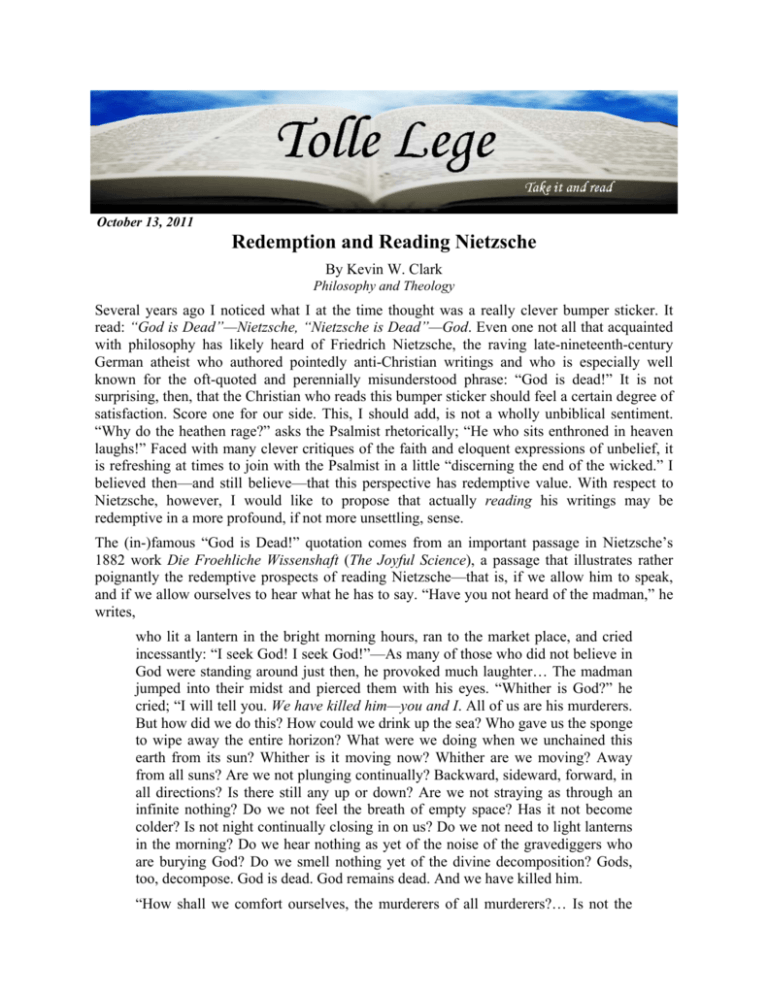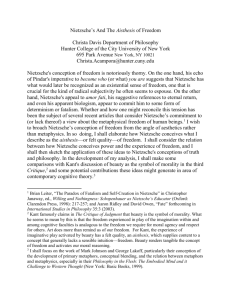Redemption and Reading Nietzsche
advertisement

October 13, 2011 Redemption and Reading Nietzsche By Kevin W. Clark Philosophy and Theology Several years ago I noticed what I at the time thought was a really clever bumper sticker. It read: “God is Dead”—Nietzsche, “Nietzsche is Dead”—God. Even one not all that acquainted with philosophy has likely heard of Friedrich Nietzsche, the raving late-nineteenth-century German atheist who authored pointedly anti-Christian writings and who is especially well known for the oft-quoted and perennially misunderstood phrase: “God is dead!” It is not surprising, then, that the Christian who reads this bumper sticker should feel a certain degree of satisfaction. Score one for our side. This, I should add, is not a wholly unbiblical sentiment. “Why do the heathen rage?” asks the Psalmist rhetorically; “He who sits enthroned in heaven laughs!” Faced with many clever critiques of the faith and eloquent expressions of unbelief, it is refreshing at times to join with the Psalmist in a little “discerning the end of the wicked.” I believed then—and still believe—that this perspective has redemptive value. With respect to Nietzsche, however, I would like to propose that actually reading his writings may be redemptive in a more profound, if not more unsettling, sense. The (in-)famous “God is Dead!” quotation comes from an important passage in Nietzsche’s 1882 work Die Froehliche Wissenshaft (The Joyful Science), a passage that illustrates rather poignantly the redemptive prospects of reading Nietzsche—that is, if we allow him to speak, and if we allow ourselves to hear what he has to say. “Have you not heard of the madman,” he writes, who lit a lantern in the bright morning hours, ran to the market place, and cried incessantly: “I seek God! I seek God!”—As many of those who did not believe in God were standing around just then, he provoked much laughter… The madman jumped into their midst and pierced them with his eyes. “Whither is God?” he cried; “I will tell you. We have killed him—you and I. All of us are his murderers. But how did we do this? How could we drink up the sea? Who gave us the sponge to wipe away the entire horizon? What were we doing when we unchained this earth from its sun? Whither is it moving now? Whither are we moving? Away from all suns? Are we not plunging continually? Backward, sideward, forward, in all directions? Is there still any up or down? Are we not straying as through an infinite nothing? Do we not feel the breath of empty space? Has it not become colder? Is not night continually closing in on us? Do we not need to light lanterns in the morning? Do we hear nothing as yet of the noise of the gravediggers who are burying God? Do we smell nothing yet of the divine decomposition? Gods, too, decompose. God is dead. God remains dead. And we have killed him. “How shall we comfort ourselves, the murderers of all murderers?… Is not the greatness of this deed too great for us?…” Here the madman fell silent and looked again at his listeners; and they, too, were silent and stared at him in astonishment. At last he threw his lantern on the ground, and it broke into pieces and went out. “I have come too early,” he said then; “my time is not yet.” This tremendous event is still on its way… this deed is still more distant from them than the most distant stars—and they have done it themselves.1 Some explanation is in order. First of all, Nietzsche is noted for his use of aphorism, preferring to use the proverb, the extended metaphor, or the parable. This passage is itself a parable, and when interpreted as such within the context of his book the exclamation “God is dead!” takes on a profound and disturbing significance. It is also important to keep in mind that, in this work, Nietzsche is concerned with the secularization of post-Enlightenment European civilization and the deeply paradoxical and even contradictory situation that entailed. Before interpreting this parable, however, allow me to explain its historical context in a little more detail. European civilization, or what we refer to as “Christendom,” is the result of the synthesis of Christianity and a renovated classical antiquity.2 Central to that synthesis is the affirmation that the universe has a fundamentally personal nature—it is a universe where man is at home, where God is intimately involved in the workings of both nature and history, and where man is clearly limited in his knowledge and in his power over nature. Over time, however, what had been fundamentally Christian assumptions about the world have come to be considered nothing more than the results of rational reflections upon nature. The orderliness and teleological character both of the universe and of human society is taken for granted. Forgetting that his worldview originated in the Christian synthesis, modern man structures human society on putatively self-evident principles, produces a science where the “God hypothesis” is no longer necessary, and achieves a technological mastery that extends the bounds of human power over nature to hitherto unimaginable limits. The result is an infinite universe where, in the words of C. S. Lewis, man is “adrift on a shoreless sea.” God is largely, if not completely, removed from the workings of nature, whose mechanism is wholly explicable in terms of Newtonian physics. It is now no longer clear that there are any limits on our knowledge of or power over the world other than those that we impose on ourselves. In short, the Enlightenment affirmed at every point the fundamentally impersonal nature of the universe. It did not, however, stop to question whether in its self-confident rationality, its bold disregard for revelation and human tradition, and its mastery of the world, it had not forfeited the birthright to the personal universe of the Christian synthesis, and along with it a coherent moral vision, a belief for human dignity, and a basis for the meaning and purpose of human life and society. Enter Nietzsche’s madman. They do not know that God is dead, he exclaims, and yet they have killed him themselves! His point is not to make the kind of metaphysical claim about reality that our present-day village atheists—for example, Richard Dawkins and the Christopher Hitchens—make, but rather to 1 Friedrich Nietzsche, The Gay Science, trans. Walter Kaufman, New York: Random House, 1974. 2 We do well to note what historians of religion have reminded us time and again: the synthesis was so comprehensive that it is not at all easy, even now, for people to sort out just where classical antiquity stopped and Christianity began. place his finger directly upon this central contradiction of European civilization. Indeed, Nietzsche seeks to place his finger directly in the eye of the autonomous and optimistic postChristian European. Don’t you understand, he asks, that by breaking the bonds of Christianity asunder and casting its yoke from your necks you have also, as it were, cut the world loose from its sun? There is no longer any up or down: are we falling? rising? infinitely adrift on a shoreless sea?; for man has left behind his ultimate Reference Point, his Center. And yet the implications of the world that European man has created have not yet occurred to him. Occur they will, however, and Nietzsche prophesies of a coming calamity for Europe: war, when nations realize that there is no longer any right or wrong in an impersonal universe, only power; and a cultural calamity, when the same realization is applied to social and personal morality. Nietzsche’s cultural analysis here is a master-stroke of philosophical insight. Delivered in the late nineteenth century, at the height both of optimism with respect to human flourishing and of fervor with respect to public morality, the last thing anyone expected was that the twentieth century would be marked by nearly continuous war whose casualties would outnumber all previous centuries’ added together. Much less would anyone have imagined the complete dissolution of the traditional family through divorce, the sexual revolution, and the public acceptance of homosexuality. Nietzsche, like the madman in his parable, perceived things ahead of his time. At this point, I am reminded that I promised some redemption, and this is it. Godless to be sure, Nietzsche has nevertheless very clearly—and devastatingly—shown us that we cannot have it both ways. He understood very clearly the demand of the Gospel that he spent his entire life seeking to subvert—namely, that a man cannot serve two masters. Nietzsche exposes his contemporaries as attempting to do just that, to have it both ways. His message, however, was not that of a new prophet calling European man to forsake his gods and repent; rather, Nietzsche urged them to carry out their program to its logical conclusion. If we already live our lives as if God does not exist, he asks, then why perpetuate the illusion? Why keep up appearances? God is dead. We’ve killed him. Let’s bury him for good and get on with life in our brave new world. It is difficult for me to communicate just how strongly this message spoke to me when I first read it as an undergraduate philosophy student. I asked myself at first whether his analysis applied to me: do I live my life as if God does not exist? Upon further reflection, I went on to ask in which areas of my life might I have unwittingly adopted practices, beliefs, and worldviews that are fundamentally irreconcilable with the Christian faith I profess with my lips? I felt strongly then that I did not want to abandon my faith in order to be consistent with the practices of the rest of my life; I wanted to amend (or perhaps abandon) the practices in the rest of my life that were in tension with my Christian profession. I feel this perhaps even more intensely now. I admit that this is an unnerving message, and perhaps doubly so coming from the messenger who delivered it. It is, however, a lesson that has stuck with me, for it was a call to serious selfexamination and to bold action to live a life that is consistent with my profession. Before reading Nietzsche I had never realized just how far reaching that call truly is.









